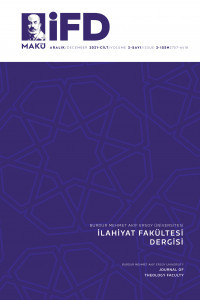HZ. PEYGAMBER'İN (S.A.S.) ÇOCUKLARLA KONUŞMASINDA KULLANDİĞİ DİLİN MODERN EĞİTİM TEORİLERİYLE KARŞILAŞTIRILMASI
Anahtar Kelimeler:
Üslup -Peygamberlikhadis- Çocukyetiştirme -Çocukluk –Eğitim Psikolojisi
___
- Duckworth, Angela L., et al. “Self-Control in School-Age Children”, Educational Psychologist, 49/3 (July 2014), 199-217.
- Fox, Robin, “Food and Eating: An Anthropological Perspective”, Social Issues Research Centre, access: 29 November 2020 http://www.sirc.org/publik/foxfood.pdf
- Harlan, J. C. – Rowland, S. T., Behavior management strategies for teachers, Springfield, Illinois: Charles C. Thomas Publisher, Ltd, 2002.
- Khalil, Khalil Mohamed, “Yükseköğretimde Ana Dili Arapça Olmayanlar İçin Arapça Öğretimi”. YükseköğretimdeArapçaEğitimi 1. ed. Ahmet Ali Çanakcı – AsemHamdy Ahmed Abdelghany. 179-221. Konya: PaletYayınları, 2020.
- LaBarbera, Michelle, “Direction Clarity: Why Do Students Struggle to Successfully Follow Directions?”,PDS Intern, 4th Grade, Radio Park Elementary School, access: 29 November 2020 https://ed.psu.edu/pds/teacher-inquiry/2007/labarberaminquiry0607.pdf
- Lippevelde, W. Van, et al., “Does parental involvement make a difference in school based nutrition and physical activity interventions? A systematic review of randomized controlled trials”, Internatıonal Journal of Public Health. 57/4 (2012), 673-681, https://www.researchgate.net/publication/221802498
- Pattison, Sue– Harris, Belinda, “Adding Value to Education through Improved Mental Health: A Review of the Research Evidence on the Effectiveness of Counselling for Children and Young People”, The Australian Educational Researcher, 33/2 (August 2006), 97-123.
- Sege, Robert D., “Effective Discipline to Raise Healthy Children”, Pediatrics, 142/6 (December 2018), 1-10.
- Simmel, Georg, The Sociology of Secrecy and of Secret Societies, 11/4 (January 1906),440-498.
- U.S. Department of Education, Office of Communications and Outreach, Helping Your Child through Early Adolescence, Jessup, MD: U.S. Department of Education, 2005.
- Yayın Aralığı: Yılda 2 Sayı
- Yayıncı: Burdur Mehmet Akif Ersoy Üniversitesi
Sayıdaki Diğer Makaleler
Badran Thaeer Abdulqader QUMRİ
EMEVİLERİN HORASAN POLİTİKASI: VALİLER DÖNEMİ
KUR’ÂN-I KERİM’İN NAZMINDAKİ MÜTEŞÂBİHLİK (TEKİL VE İKİL)
EŞ’ARÎ KELAMINDA METODOLOJİK DÖNÜŞÜMÜN ÖNCÜLERİ OLARAK CÜVEYNÎ VE GAZZÂLÎ
İBN FARİS’İN FÜTYÂ FAKĪHİ’L-ʿARAB ADLI KİTABINDA ÇOKANLAMLILIK
İSTİHSÂNIN GERÇEK MAHİYETİ-1 -KİTÂB KAPSAMINDA AKILLA BİRLİKTE
